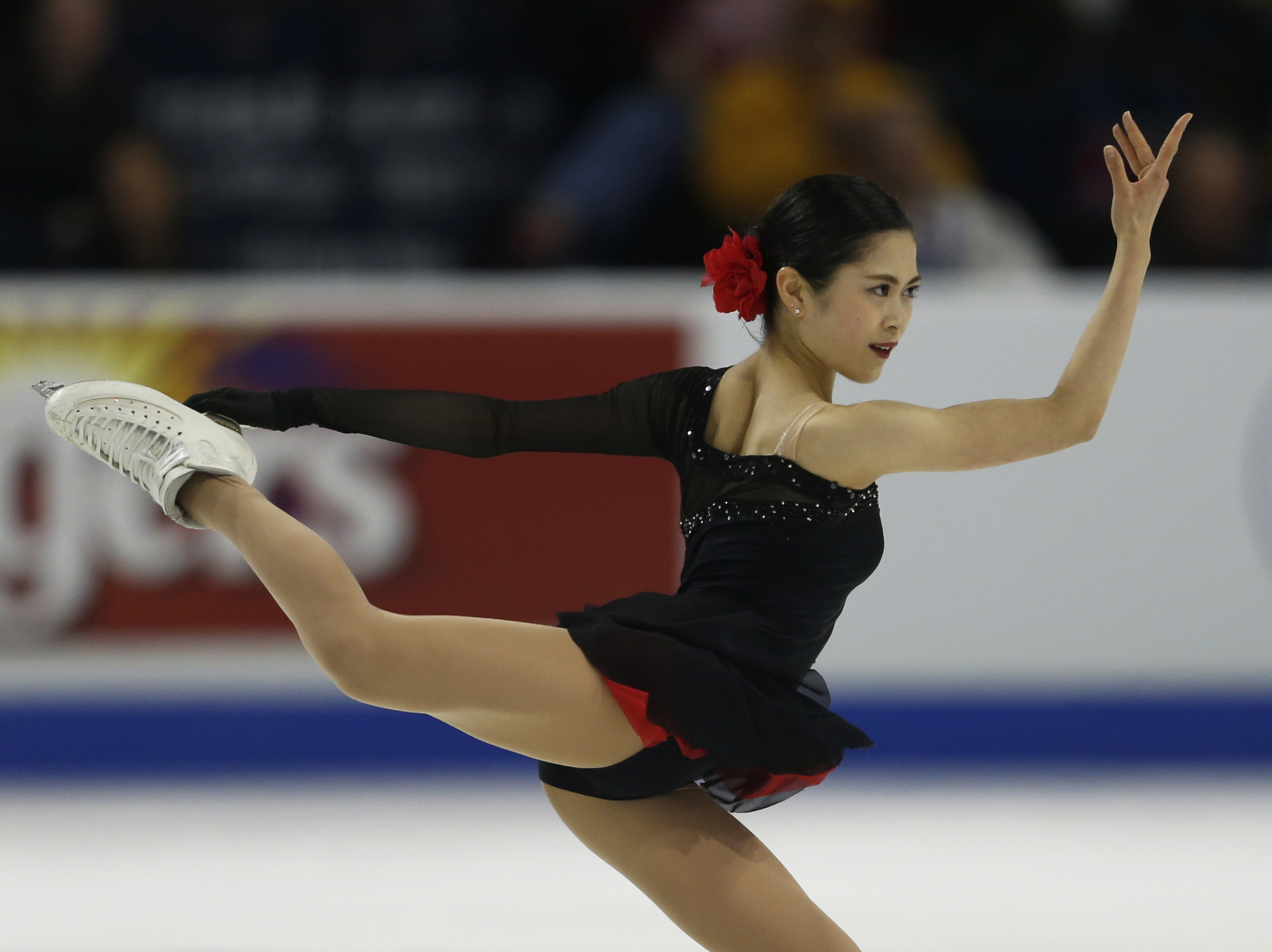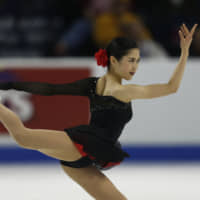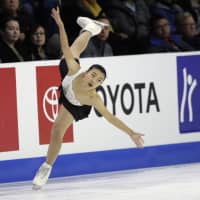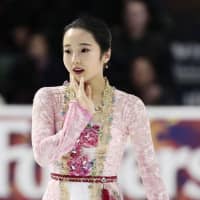Satoko Miyahara and Kaori Sakamoto started the senior Grand Prix season off with a bang on Sunday, finishing 1-2 at Skate America in Everett, Washington. The two stars illustrated why they were the two women selected to represent Japan at the Pyeongchang Olympics.
Miyahara took home the gold for the second straight year, winning with a total score of 219.71 points, while Sakamoto settled for second again, like last year, with 213.90. The results give both skaters an early leg up on making the Grand Prix Final.
The 20-year-old Miyahara was her usual sublime self, awing spectators and commentators with her beautiful line and edge and stunning interpretation.
Analyst Tara Lipinski summed up Miyahara's performance at Skate America on the NBC telecast by saying, "She brings out the emotion to any music she is skating to. She is a skater that could skate to no music at all and make it interesting."
Miyahara sizzled in a beautiful blue dress to "Song for the Little Sparrow" in her short program on Saturday and drew praise from Lipinski and colleague Johnny Weir.
"The attention to detail is what to look for artistically from Satoko. Every movement has a meaning," Weir stated.
"Such a perfectionist. You can see that in all the details of this program," Weir continued. "The facial expression, the lilt of her wrist. It's so lovely. She skates like a dream."
Lipinski, the 1998 Olympic gold medalist, was effusive in her praise for the four-time defending Japan champion.
"What impressed me the most was the program. That was stunning. It was a dream," Lipinski commented. "She is a little butterfly out there. She is so precise with her movement, but it is never forced. She is living in it. It was beautiful."
Miyahara landed seven triple jumps in her free skate to "Invierno Porteno" on the way to victory and said she was content afterward.
"I am very happy to skate very clean today. I was very nervous until the very end of the program, because I have jumps until the end," Miyahara was quoted by the ISU website. "I hope I'll have more confidence in my next competition."
Kaori soars again
Sakamoto picked up where she left off last season, using her full arsenal of skills and fortitude to take the silver again.
Lipinski and Weir both liked Sakamoto's skating, but also had criticism of her interpretation.
"I like the style of her skating, the freeness and the lightness, but at the same time it comes across as a little bit too sloppy for me," Lipinski stated during Sakamoto's short program to "From My First Moment."
"She has such a nice rhythm to her jumps that gives her that lift in the air," Lipinski added.
Weir echoed Lipinski's sentiments, saying, "There is a messy quality, though, which is kind of charming about her skating. However, you don't see her as a leading lady yet because it is too messy."
Weir, a three-time U.S. champion, did admire Sakamoto's jumps, before returning to his displeasure about her arm and shoulder movements.
"Her jump technique is so nice. Her feet are nice and tight," Weir analyzed. "She's got nice knee bend in those jumps. Good rotating position of the upper body.
"The way she skates and utilizes her knee bends, her ankles and her connection to the ice is the most artistic thing about her," Weir commented. "Tara and I were talking during the break about just how messy she is. Through her shoulders, through her arms, there's an abandon to it that isn't necessarily the same as what she gives us with her lower body."
Ice Time has some issues with this depiction of Sakamoto. Essentially what Lipinski and Weir were saying is that Sakamoto is just a good jumper.
To which I say, you don't make Japan's Olympic team in this day and age, win the Four Continents, and finish sixth in the Olympics by being just a jumper.
Did Lipinski and Weir see Sakamoto's performance to "Amelie" last season?
I wonder. It sure doesn't sound like it.
Sakamoto hit seven triples in her free skate, while earning level fours on her spins and step sequence to "The Piano," but again earned only grudging respect from Weir.
"Kaori was stellar today. She really fought for every jump. She made it look effortless," Weir noted. "There are still some deficiencies in her program components, but beautiful speed, beautiful skating skills, she does have those. The jumps are much more exciting and better technique than Satoko Miyahara."
Sakamoto was content with her showing and is looking ahead.
"I am very satisfied with my performance today and I hope it will encourage me for my future competitions," Sakamoto said Sunday. "I will keep working hard towards my next Grand Prix in Finland."
Honda looks helpless
Marin Honda was fourth after the short program, raising hopes of a Japan sweep, but came undone in the free skate and wound up eighth on 158.04.
Honda's short program to "Seven Nation Army" was hindered by under-rotations on her triple toe loop and triple flip. This didn't stop Lipinski and Weir from heaping praise on the 17-year-old.
"I love how 'big' she is skating this season. There has been a lot of growth over the last year," Weir stated. "That Olympic season puts a lot of pressure on everybody and it got to Marin last season.
"This is a whole new skater. She skates big. There's the drama, there's the connection between us and her as a performer. It was just lovely to watch."
"She combines this lightness and power to her skating that I just love," gushed Lipinski.
As Ice Time was watching Honda's short program he wondered what Weir and Lipinski were on about.
Marin skates big? Compared to who?
No, she doesn't. Alina Zagitova, Evgenia Medvedeva, Kaetlyn Osmond and Sakamoto skate big.
After the judges had their say, Weir and Lipinski changed their tunes.
"Marin tends to land flat-footed on her jumps, which isn't necessarily a mistake, it just makes you more under-rotation prone," Weir commented.
"She slows down just a little bit. You need to have that snap in the front of the jump, but you also need to be thinking of that landing," Lipinski said while watching a replay of Honda's jumps. "You need to envision yourself coming back straight back."
Honda's total collapse in her free skate to "House of Flying Daggers" brought Weir and Lipinski back to reality.
In fairness to Honda, she told the media following her free skate that her right ankle had been bothering her. This could provide some explanation for her falling on the back end of her opening triple lutz/triple toe loop combo and getting five under-rotations on other jumps.
Lipinski recognized that something appeared off on Honda's jumps.
"It almost looks like her ankle is just collapsing," Lipinski said.
"She brings the lightness and joyful expression to her skating and I didn't get that from this free skate," Lipinski added. "There are so many mistakes technically, it affects how you see the entire performance."
Weir gave an accurate depiction in his assessment of Honda's free skate.
"She looked more like a prisoner than a joyous athlete out there being such a great artist," Weir stated.
The greater concern, as Ice Time sees it, was again Honda's lack of emotion or passion in the wake of her results. As she sat waiting for her scores, she looked like a deer caught in the headlights.
Just once I would like to see Honda show some fire and react. Instead, she sat there and didn't say a word as coach Rafael Arutunian talked to her.
Honda remains a real enigma. I hope that someday soon she can turn her fortunes around and become the great skater she has the potential to be.
Uno, Higuchi at Skate Canada
Olympic and world silver medalist Shoma Uno will make his GP season debut this week at Skate Canada in Laval, Quebec. Uno will be joined in the men's field by compatriot Kazuki Tomono, who was fifth at the worlds last season.
The primary competition for Uno and Tomono is likely to come from South Korea's Cha Jun-hwan, who trains with Yuzuru Hanyu in Toronto under Brian Orser.
World silver medalist Wakaba Higuchi is one of featured skaters in the women's lineup. Higuchi will lead a team that includes Yura Matsuda and Mako Yamashita. The 16-year-old Yamashita will be making her senior GP debut at the event.
Two-time world champion Evgenia Medvedeva and resurgent former world champion Elizaveta Tuktamysheva of Russia should provide a real test for the Japan trio.





















With your current subscription plan you can comment on stories. However, before writing your first comment, please create a display name in the Profile section of your subscriber account page.